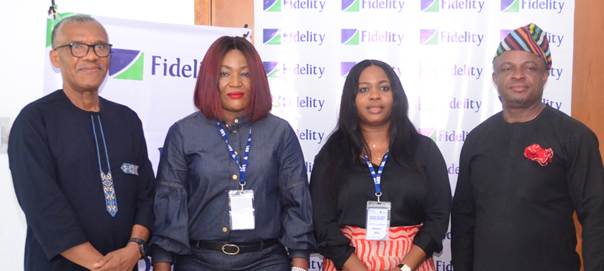General News
Fidelity Bank Strengthens Entrepreneurs’ Global Trade Skills with EMP 18 Programme

Fidelity Bank Plc, has once again highlighted the importance of promoting non-oil exports as it recently hosted the 18th edition of its dedicated capacity development training tagged Export Management Programme (EMP 18). The programme, which was held recently in Lagos provided a platform for entrepreneurs interested in exploring global trade opportunities to scale and acquire relevant expertise.

L-R: Prof Frank Ojadi, Director, Export Management Program, Lagos Business School; Stella Nwuke, Team Member, Export & Agriculture Division, Fidelity Bank Plc; Emem Bassy, Managing Partner, Peony Dynamic Resource Limited; and Emmanuel Nwalor, Team Lead, Export & Agriculture Division, Fidelity Bank Plc; at the closing ceremony of the 18th edition of the Fidelity Bank Export Management Programme (EMP 18) held at the Lagos Business School recently.
Hosted in partnership with the Lagos Business School (LBS), the 5-day intensive program focused on equipping entrepreneurs with the skills and knowledge needed to explore international market opportunities and strengthen their capacity to thrive in the export sector.
“At Fidelity Bank, our strategy to enhance non-oil exports is guided by the significant opportunities it offers to our customers and the national economy. This is why we offer a comprehensive suite of financial, advisory, and market-access solutions for businesses aiming to engage in international trade.
“Our market-access initiative, EMP, launched in 2016, has trained over 1,600 entrepreneurs. Today, we completed the 18th cohort with high-caliber participants and a 150% oversubscription. This indicates a promising future for Nigeria’s non-oil exports,” explained Isaiah Ndukwe, Divisional Head of Export and Agriculture at Fidelity Bank Plc.
Facilitated by key industry experts in the exports space, EMP 18 took participants through several sessions focused on critical areas in global trade such as Export Finance Instruments, Export Documentation, Accessibility of Export Markets, amongst others.
A key feature of the training was a facility tour of one of Nigeria’s busiest Export Processing Terminals (EPT) located in Ikorodu, Lagos state. The full-day visit, which was anchored by officials of the Nigerian Customs Service (NCS), gave participants a first-hand feel of the necessary procedure and requirements for securing regulatory approval for exporting from Nigeria.
One of the program participants, Patrick Ulayi Awu-Patricks, Managing Director/Chief Executive Officer, Alliance & Frontier Limited, commended Fidelity Bank for its leadership in deploying capacity-building initiatives in the non-oil exports sector. In a discussion with journalists, he stated that EMP 18 provided invaluable exposure to the opportunities in the export business noting that, “There are lots of non-oil exports opportunities and entrepreneurs must be able to identify and capitalize on these to be able to play effectively in the international trade space. This course has given me insights into the power of data which is essential for strategic decision-making.”
Ranked among the best banks in Nigeria, Fidelity Bank Plc is a full-fledged Commercial Deposit Money Bank serving over 8.5 million customers through digital banking channels, its 255 business offices in Nigeria and United Kingdom subsidiary, FidBank UK Limited.
The Bank is the recipient of multiple local and international Awards, including the Export Finance Bank of the Year at the 2023 BusinessDay Awards; the Banks and Other Financial Institutions (BAFI) Awards; Best Payment Solution Provider Nigeria 2023; and Best SME Bank Nigeria 2022 by the Global Banking and Finance Awards. It was also recognized as the Best Bank for SMEs in Nigeria by the Euromoney Awards for Excellence 2023 and the Best Domestic Private Bank in Nigeria by the Euromoney Global Private Banking Awards 2023.
General News
Burna Boy Distances Himself from Meme Coin, Labels Crypto as Fraud

Burna Boy, Grammy-winning Nigerian artist, has publicly distanced himself from a meme coin circulating online that falsely uses his name and image for promotion.

Burna Boy
In a statement shared via Instagram, the Afrobeats star made it clear that he has no involvement in any cryptocurrency ventures, describing such schemes as fraudulent.
His comments come amid growing traction of a meme coin allegedly linked to him, which has been circulating on social media platform X (formerly Twitter).
“I don’t do any internet ‘coin’ business. I see it as fraud and I have no interest in any of that,” Burna Boy wrote. “So if you see anyone using my name for such, please disregard or report them.”
The singer urged fans to remain vigilant and to report anyone promoting the crypto project under false pretenses.
General News
AM Best Reaffirms Stable Outlook for Cyber Insurance Market

AM Best has reaffirmed its stable outlook for the global cyber insurance market. The rating agency notes that strong demand for cyber insurance coverage is expected to continue, supporting profitability across the sector despite intensifying competition.

Atlas Magazine reports that the small and medium-sized enterprise (SME) segment presents a key growth opportunity, as many SMEs remain underinsured or lack sufficient cyber coverage.
Rising awareness of cyber threats has also led policyholders to enhance their IT security measures, helping reduce potential losses in the event of a claim.
AM Best’s outlook is further supported by several factors, including sustained capital inflows from reinsurers and alternative capital providers, the use of artificial intelligence for more effective risk selection, and favorable regulatory developments.
According to Munich Re, global cyber insurance premiums reached $15.3 billion in 2024, climbing seven per cent year-on-year.
The market is projected to grow at an average annual rate exceeding 10 per cent through 2030.
However, the industry continues to grapple with challenges such as a rise in ransomware attacks, business email compromise, and payment fraud. The growing use of AI by cybercriminals is also amplifying the scale and sophistication of such attacks.
General News
Woodhall Capital and Partners Launch ₦1.5Bn Fund

Woodhall Capital in partnership with Polaris Bank, Lagos and UK governments have announced the launch of a ₦1.5 billion Creative Sector Fund aimed at expanding access to structured financing for creative entrepreneurs meant to scale their output across fashion, film, music, and digital content.

L-R- Abimbola Ozomah, Executive Director, Polaris Bank; Mojisola Hunponu-Wusu, Founder/CEO, Woodhall Capital; Sola Carrena, MD/CEO, Helios Investment; Onyinyechi Aderigbigbe, Head, Brands & Marketing, Woodhall Capital; Jonny Baxter, British Deputy High Commissioner at the signing ceremony of the N1.5bn Creative Sector Fund & Launch of the Creative Currency Podcast at the weekend, Lagos
The fund was unveiled during the launch of the Creative Currency Podcast, an initiative designed to foster collaboration between creatives, financiers, policymakers, and global stakeholders.
The platform will serve as both a podcast and policy engagement forum, tackling long-standing challenges such as limited access to finance, weak Intellectual Property(IP) enforcement, and the absence of scalable business infrastructure within the creative ecosystem.
In May 2022, Polaris Bank partnered with the Lagos State Employment Trust Fund (LSETF) to establish a ₦1 billion funding initiative targeted at artisans in Lagos State.
The objective of the partnership was to deliver critical financial support to empower skilled artisans and entrepreneurs within the MSME sector who had maintained active business operations for at least one year ultimately fostering wealth creation and economic inclusion across the state.
At the launch event held on Thursday evening at the Ikoyi residence of the British Deputy High Commissioner, Polaris Bank’s Executive Director, Abimbola Ozomah, who sat on a panel at the launch, emphasized that the fund is a long-overdue response to the structural exclusion of creatives from formal financing systems. She described the initiative as a deliberate attempt to recognize creative endeavours, intellectual property as a bankable asset and to build a framework where creatives are treated as serious entrepreneurs capable of generating significant economic value.
“This fund represents more than capital, it reflects our belief in Nigerian creativity as a global force,” said Polaris Bank’s Executive Director, Abimbola Ozomah. “We’re not just exporting talent. We’re exporting ownership, structure, and long-term value.”
Founder and CEO of Woodhall Capital, Mojisola Hunponu-Wusu, reiterated the urgent need to redefine how the financial system engages with the creative sector. She committed to providing bespoke financial products, advisory services, and investor-matching support tailored specifically for the needs of creative MSMEs.
The UK Government, through the British Deputy High Commissioner, Mr. Jonny Baxter, highlighted its longstanding commitment to Nigeria’s creative economy. The UK-Nigeria Creative Industries Partnership signed in 2024 was cited as a milestone in unlocking trade, investment, and collaborative opportunities between both countries. The Deputy High Commissioner praised the initiative as a blueprint for global creative cooperation.
The Lagos State Government, a key driver of the initiative, reaffirmed its ambition to cement Lagos as Africa’s creative capital. According to the Governor’s representative, Representing the Governor, Mrs. Folashade Ambrose-Medebem, Honourable Commissioner for Commerce, Cooperatives, Trade and Investment, highlighted the state’s efforts in supporting the sector through progressive policy reforms, infrastructure development, and the provision of zero-interest loans of up to ₦10 million via the Lagos Creative Fund. These measures are designed to empower creatives to scale operations, access markets, and formalize their business practices.
The newly launched Creative Currency Podcast is positioned to be more than a media channel. It is a knowledge-sharing ecosystem that brings together local talents, international investors, legal experts, and cultural stakeholders to explore opportunities, identify risks, and share solutions that will elevate Nigeria’s creative industries to global standards.
Throughout the panel sessions, panelists emphasized the need for deeper structure, transparency, and professionalism in the sector. Creators were encouraged to develop clear business plans, maintain accurate financial records, formalize their operations, and assert their rights to royalties and IP protection.
As conversations deepened, financial institutions acknowledged the need for a mindset shift. Traditional risk models, they agreed, must be reimagined to reflect the unique nature of creative enterprises many of which are driven by intangible assets, flexible revenue models, and export potential.
The event concluded with a call to action: invest in the systems, not just the stories. Stakeholders were unanimous in their belief that a more structured, collaborative, and well-capitalized creative economy will deliver jobs, exports, and global relevance for Nigeria.
Polaris Bank has built a strong footprint in financing MSME by committing billions of naira in loans to support MSME operations in Nigeria, with huge lending portfolio dedicated to empower micro, small, and medium businesses meant to grow businesses, create jobs, and build wealth.

 Broadcasting1 day ago
Broadcasting1 day agoNigeria Week Ahead: Inflation, Oil and Naira in focus

 News1 day ago
News1 day agoEFCC: Accusations Against Our Chairman Are Baseless and Misleading

 General News12 hours ago
General News12 hours agoWoodhall Capital and Partners Launch ₦1.5Bn Fund

 General News12 hours ago
General News12 hours agoAM Best Reaffirms Stable Outlook for Cyber Insurance Market

 E-Business12 hours ago
E-Business12 hours agoFirm Highlights Top Risks of Quantum Computing

 Telecom11 hours ago
Telecom11 hours agoMTN Nigeria Targets $1Bn Cloud Market with Largest Modular Data Centre

 News12 hours ago
News12 hours agoFirstBank, NLNG, Shell back QEDNG Creative Powerhouse Summit

 News12 hours ago
News12 hours agoExperts Urge MSMEs to Build Strong Partnerships in Solving Problems,


























